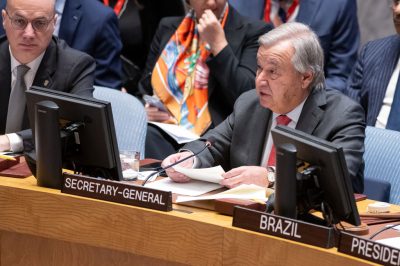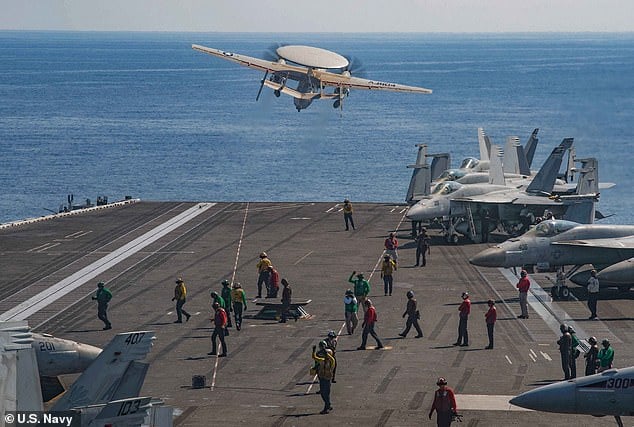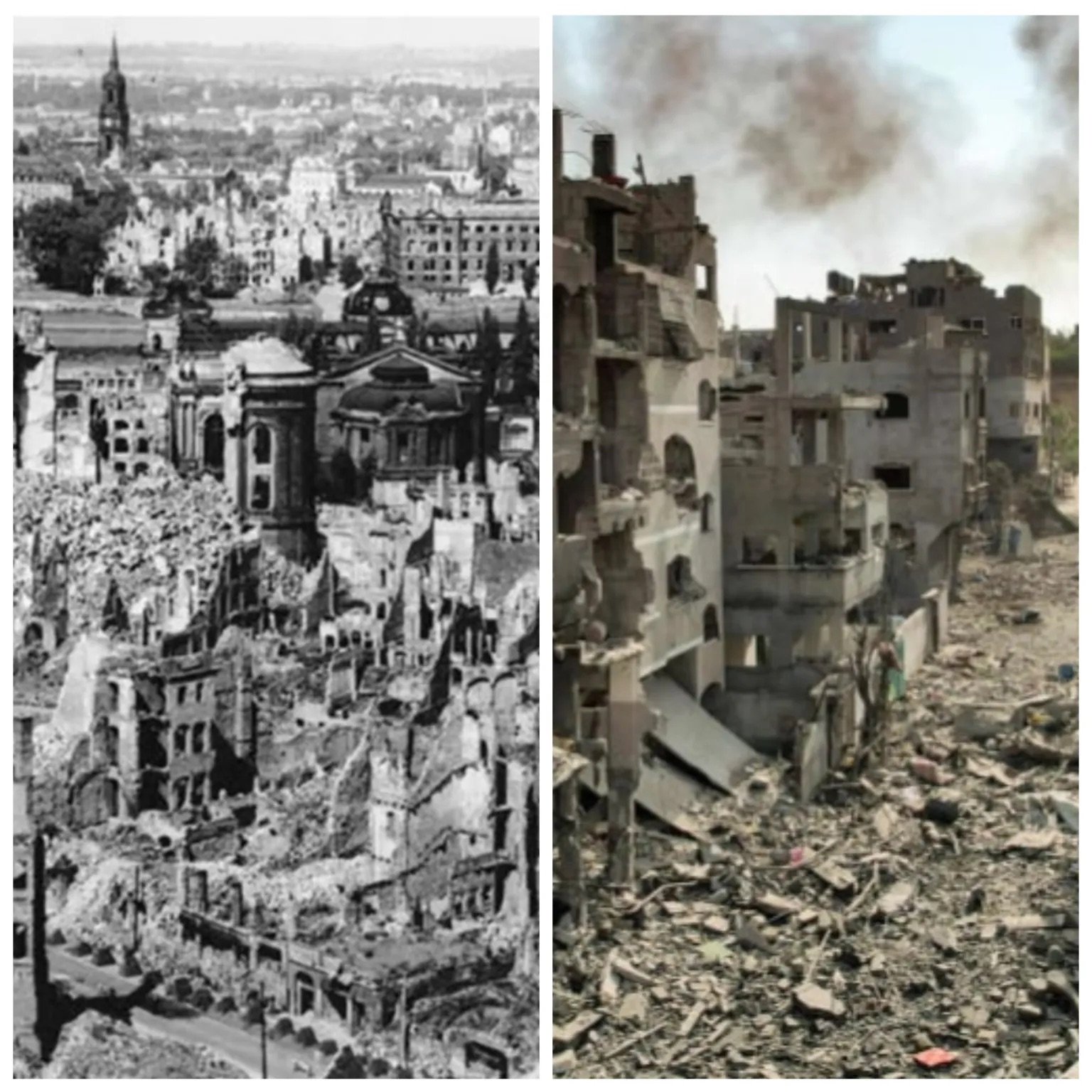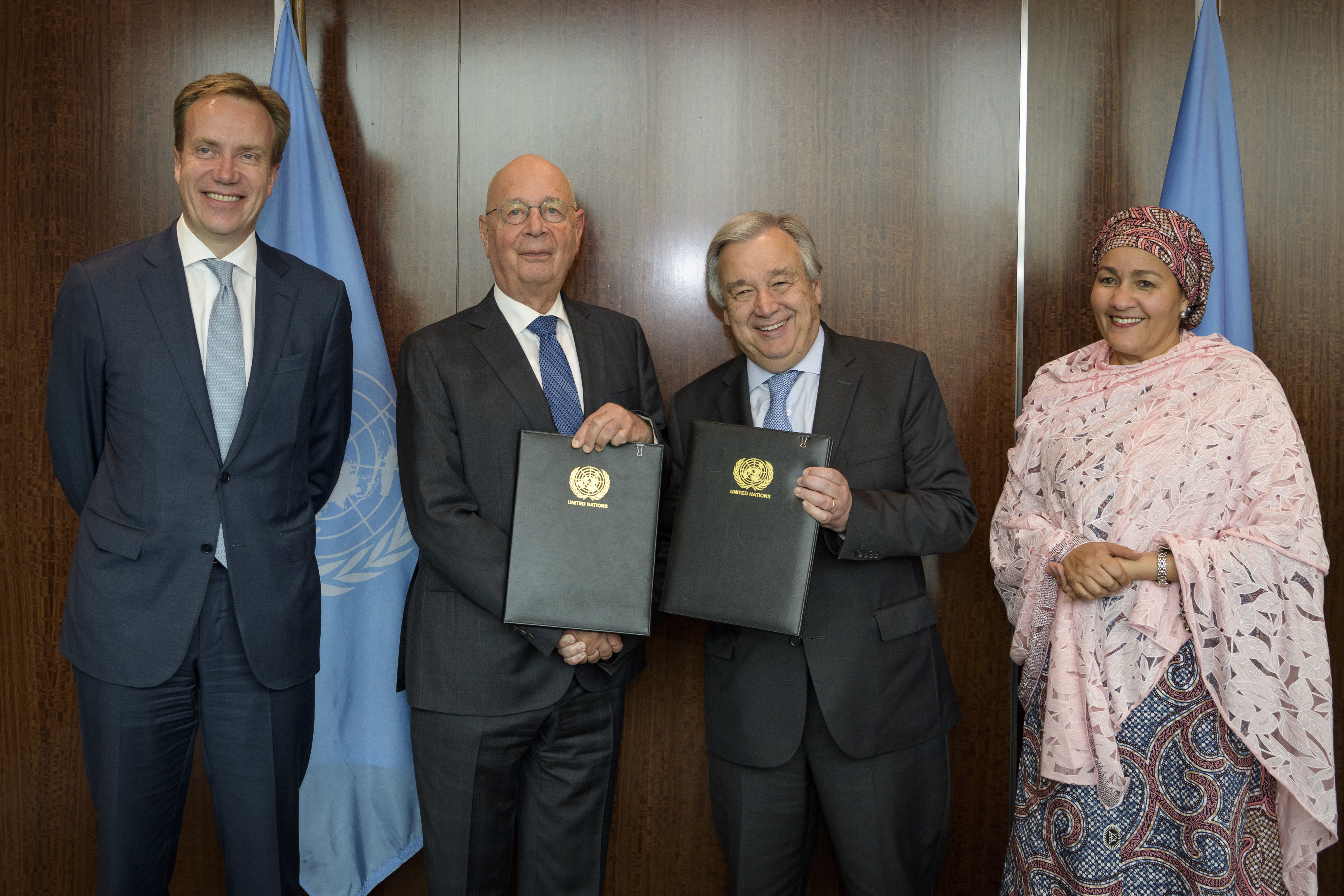Will the United Nations Firmly Acknowledge “Israel’s Criminal Agenda” Against the People of Palestine? Statement of UNSG Antonio Guterres

All Global Research articles can be read in 51 languages by activating the Translate Website button below the author’s name.
To receive Global Research’s Daily Newsletter (selected articles), click here.
Click the share button above to email/forward this article to your friends and colleagues. Follow us on Instagram and Twitter and subscribe to our Telegram Channel. Feel free to repost and share widely Global Research articles.
***
Introduction
According to U.N. Secretary-General (UNSG) Antonio Guterres in his remarks to the U.N. Security Council on October 24:
“The situation in the Middle East is growing more dire by the hour.
The war in Gaza is raging and risks spiralling throughout the region.
Divisions are splintering societies. Tensions threaten to boil over.
At a crucial moment like this, it is vital to be clear on principles — starting with the fundamental principle of respecting and protecting civilians.”
Guterres’s disapproval of Israel is lenient. He does not condemn Tel Aviv for the massive killings of Palestinian civilians (in the carpet bombing of Gaza) which so far have resulted in more than 5,000 Palestinian deaths, nor does he raise (in his initial remarks) the issue of a “cease fire”:
“The Palestinian people have been subjected to 56 years of suffocating occupation.
They have seen their land steadily devoured by settlements and plagued by violence; their economy stifled; their people displaced and their homes demolished. Their hopes for a political solution to their plight have been vanishing.
But the grievances of the Palestinian people cannot justify the appalling attacks by Hamas. And those appalling attacks cannot justify the collective punishment of the Palestinian people.”
…
Guterres does not address the displacement of 750,000 Palestinians in 1948 by Israel and the setting up of an Apartheid state by Tel Aviv which denies Palestinians’ basic human rights.
Who Is Attacking Whom? Towards a Broader War in the Middle East?

The issue of the Armada of two US aircraft carriers which “have come to the rescue of Israel” us not mentioned by Guterres.
According to Western Media reports Israel is being “Attacked by Palestine”(see Daily Mail quoted by Global Research):
“The US is ramping up firepower in the Middle East to deter Iran from starting WW III – with an armada of 13 warships, over 100 fighter jets, cruise missiles, spy planes and 2,000 amphibious special forces massing in the region.”
UNSG Antonio Guterres fails to address or analyze the underlying implications, namely the extensive US-NATO military buildup throughout the Middle East, nor does he mention the Israeli air attacks against Lebanon and Syria.
What is unfolding is best described as “The Internationalization of war”.
Is Israel Under Attack?
Guterres “equates” Hamas and Israel without acknowledging that while:
- Israel is categorized as having the 4th largest Armed Forces Worldwide. In contrast
- Hamas, is an Islamist entity with limited military capabilities, covertly supported by Israeli Intelligence since its inception in 1987.
Ironically, “The Hamas-Mossad partnership” is confirmed by Netanyahu:
“Anyone who wants to thwart the establishment of a Palestinian state has to support bolstering Hamas and transferring money to Hamas. … This is part of our strategy – to isolate the Palestinians in Gaza from the Palestinians in the West Bank.” (March 2019 Statement quoted by Haaretz, October 9, 2023, emphasis added)
Israel’s Reaction to UNSG Antonio Guterres’s Statement
Ironically, Guterres’s mild criticism of Israel is not tolerated by Tel Aviv whose U.N. ambassador Gilad Erdan has demanded the resignation of UN Secretary General Antonio Guterres.
Not only is Israel demanding Guterres’s resignation but its officials have “proudly compared” its killing of Palestinian civilians to the Allied bombing of the German cities of Dresden and Hamburg at the end of World War II, which quite deliberately targeted civilians.
According to Wyatt Reed:
“In an October 16 interview, the Israeli ambassador to the UK, Tzipi Hotovely, shrugged off concerns about the thousands of innocents killed in IDF strikes on Gaza, suggesting that because Allied powers killed tens of thousands of German civilians with relentless airstrikes in the 1940s, Israel is entitled to do the same.
“There were many, many civilians [that] got attacked from your attacks on German cities,” she told a Sky News anchor. “Dresden was a symbol, but you attacked Hamburg, you attacked other cities, and altogether it was over 600,000 civilian Germans that got killed.”
Comparing the militarily occupied Palestinian population to Nazis, Hotovley continued: “Was it worth it in order to defeat Nazi Germany? And the answer was yes.”
Former Israeli Prime Minister Naftali Bennett declared [on October 12] that “when Great Britain was fighting the Nazis during World War Two, no one asked what’s going on in Dresden.” (Gray Zone, October 23, 2023)
There are no calls by Guterres for the U.N. to investigate the obvious war crimes of Israel in Gaza or even to call them war crimes.
Nor has the UNSG asked the International Criminal Court (ICC) to investigate these crimes and to sanction Israeli officials and issue arrest warrants for them as the ICC quickly did in the case of Russian President Vladimir Putin.
“The ICC actions against Putin border on ridicule.”
Putin was accused by the ICC of kidnapping Ukrainian children whereas he was actually saving them from the bombing and rocket attacks of neo-Nazi Ukrainian forces that have been ongoing since 2014 and have killed 14,000 people.
Secretary General Antonio Guterres concludes on a “positive note”:
“The relentless bombardment of Gaza by Israeli forces, the level of civilian casualties, and the wholesale destruction of neighborhoods continue to mount and are deeply alarming.
…
“Even in this moment of grave and immediate danger, we cannot lose sight of the only realistic foundation for a true peace and stability: a two-State solution.
Israelis must see their legitimate needs for security materialized, and Palestinians must see their legitimate aspirations for an independent State realized, in line with United Nations resolutions, international law and previous agreements.
Finally, we must be clear on the principle of upholding human dignity.
Polarization and dehumanization are being fueled by a tsunami of disinformation.
We must stand up to the forces of antisemitism, anti-Muslim bigotry and all forms of hate.” (See full text below)
The Broader Issue: The Role of the United Nations
Will a cease fire be contemplated by the United Nations Security Council?
Will the U.N. address the militarization of the Middle East?
Will the issue of Israeli War Crimes against the people of Palestine be brought to the attention of the International Criminal Court (ICC)?
According to the late Father Miguel D’Escoto Brockmann who served as President of the U.N. General Assembly in 2008-2009:
“Those of us who do understand the nefariousness of the empire, and the ever-increasing danger it represents, must be clear that the effective defense of life on planet Earth, including that of the human species itself, inexorably demands the existence of an independent and democratic world forum for a genuine and effective defense of the rights of Mother Earth and of humanity.
That is why we insist, repeat and say time and again that the United Nations as it exists today is useless, inoperative, dysfunctional and an instrument of the empire. That is why it no longer enjoys any confidence or credibility whatsoever. ” (emphasis added)
Towards the Privatization of the United Nations
The UN increasingly serves the interests of “Global Capitalism” in what is described by Prof. Michel Chossudovsky as
“The Hegemonic U.N-WEF-NATO Triad”
Chossudovsky points out that The 2030 UN Sustainable Development Project is being carried out in close coordination with Klaus Schwab and the World Economic Forum’s (WEF) “Great Reset”, which serves the interests of the global financial establishment.
Needless to say, Big Money call the shots:
“A strategic partnership was signed in 2019 at a meeting held at UN headquarters between UN Secretary-General António Guterres and WEF Executive Chairman Klaus Schwab “to accelerate the implementation of the 2030 Agenda for Sustainable Development.”
“This partnership is in blatant violation of the UN Charter. The UNSG is in conflict of interest. Guterres has provided a Green Light to the implementation of the WEF’s “Great Reset” Agenda on behalf of powerful financial interests and corrupt politicians, which essentially consists in impoverishing the entire planet.”
The Centre for Research on Globalization (CRG), October 26, 2023
This text was written by Dr. Asad Ismi and Prof. Michel Chossudovsky
Full Text of United Nations Secretary General Antonio Guterres
October 24, 2023
Emphasis added
***
Mr. President, with your permission, I will make a small introduction and then ask my colleagues to brief the Security Council on the situation on the ground.
Excellencies,
The situation in the Middle East is growing more dire by the hour.
The war in Gaza is raging and risks spiralling throughout the region.
Divisions are splintering societies. Tensions threaten to boil over.
At a crucial moment like this, it is vital to be clear on principles — starting with the fundamental principle of respecting and protecting civilians.
I have condemned unequivocally the horrifying and unprecedented 7 October acts of terror by Hamas in Israel.
Nothing can justify the deliberate killing, injuring and kidnapping of civilians – or the launching of rockets against civilian targets.
All hostages must be treated humanely and released immediately and without conditions. I respectfully note the presence among us of members of their families.
Video
Excellencies,
It is important to also recognize the attacks by Hamas did not happen in a vacuum.
The Palestinian people have been subjected to 56 years of suffocating occupation.
They have seen their land steadily devoured by settlements and plagued by violence; their economy stifled; their people displaced and their homes demolished. Their hopes for a political solution to their plight have been vanishing.
But the grievances of the Palestinian people cannot justify the appalling attacks by Hamas. And those appalling attacks cannot justify the collective punishment of the Palestinian people.
Excellencies,
Even war has rules.
We must demand that all parties uphold and respect their obligations under international humanitarian law; take constant care in the conduct of military operations to spare civilians; and respect and protect hospitals and respect the inviolability of UN facilities which today are sheltering more than 600,000 Palestinians.
The relentless bombardment of Gaza by Israeli forces, the level of civilian casualties, and the wholesale destruction of neighborhoods continue to mount and are deeply alarming.
I mourn and honour the dozens of UN colleagues working for UNRWA – sadly, at least 35 and counting – killed in the bombardment of Gaza over the last two weeks.
I owe to their families my condemnation of these and many other similar killings.
The protection of civilians is paramount in any armed conflict.
Protecting civilians can never mean using them as human shields.
Protecting civilians does not mean ordering more than one million people to evacuate to the south, where there is no shelter, no food, no water, no medicine and no fuel, and then continuing to bomb the south itself.
I am deeply concerned about the clear violations of international humanitarian law that we are witnessing in Gaza.
Let me be clear: No party to an armed conflict is above international humanitarian law.
Excellencies,
Thankfully, some humanitarian relief is finally getting into Gaza.
But it is a drop of aid in an ocean of need.
In addition, our UN fuel supplies in Gaza will run out in a matter of days. That would be another disaster.
Without fuel, aid cannot be delivered, hospitals will not have power, and drinking water cannot be purified or even pumped.
The people of Gaza need continuous aid delivery at a level that corresponds to the enormous needs. That aid must be delivered without restrictions.
I salute our UN colleagues and humanitarian partners in Gaza working under hazardous conditions and risking their lives to provide aid to those in need. They are an inspiration.
To ease epic suffering, make the delivery of aid easier and safer, and facilitate the release of hostages, I reiterate my appeal for an immediate humanitarian ceasefire.
Excellencies,
Even in this moment of grave and immediate danger, we cannot lose sight of the only realistic foundation for a true peace and stability: a two-State solution.
Israelis must see their legitimate needs for security materialized, and Palestinians must see their legitimate aspirations for an independent State realized, in line with United Nations resolutions, international law and previous agreements.
Finally, we must be clear on the principle of upholding human dignity.
Polarization and dehumanization are being fueled by a tsunami of disinformation.
We must stand up to the forces of antisemitism, anti-Muslim bigotry and all forms of hate.
Mr. President,
Excellencies,
Today is United Nations Day, marking 78 years since the UN Charter entered into force.
That Charter reflects our shared commitment to advance peace, sustainable development and human rights.
On this UN Day, at this critical hour, I appeal to all to pull back from the brink before the violence claims even more lives and spreads even farther.
Thank you very much.
Update, October 27, 2023
United Nations Security Council Vote on New Resolutions
Transcript
Security Council to vote on new resolutions over Gaza crisis, proposed by Russia and the United States, calling for a humanitarian pause in Gaza.
China and Russia today (25 Oct) vetoed a draft resolution sponsored by the United States, while a second Russian-backed resolution failed to adopt having failed to get sufficient votes in favour, deepening the Security Council’s deadlock over any unified response to address the crisis in Gaza and Israel.
Speaking before the vote US Ambassador Linda Thomas-Greenfield said,
“Russia has offered up yet another resolution in bad faith and this Council should not stand for it. Instead, we should come together around the resolution proposed by the United States – a resolution that not only includes, but also builds on, many elements of the text Brazil put forward last week.”
For his part, Russian Ambassador Vasily Nebenzya said,
“the US, trying to tamper the sharp criticism against it for using its veto – and this is from the international community – is trying to push through a kind of new draft plumped, full of politicized, irrelevant, and very dubious provisions. I’d like to point out that no normal consultative process on it was conducted in the Council, despite the fact that our American colleague has just assured us of the very opposite.”
Ten members of the Council voted for the US drafted resolution and three against (China, Russia and UAE), with two abstentions (Brazil and Mozambique). Speaking after the vote, China’s Ambassador Zhang Jun said,
“it’s worth being vigilant that the draft departs from the spirit of previous UN resolutions and embeds the dangerous logic of confrontation of civilizations and the justification of war and the use of force. If the draft had been adopted, it would have completely dashed the prospect for the realization of the two-state solution and plunged the Palestinian and Israeli peoples into a vicious cycle of hatred and confrontation.”
A ‘no’ vote from any one of the five permanent members of the Council stops action on any measure put before it. The body’s permanent members are China, France, Russian Federation, the United Kingdom, and the United States. A second draft resolution, led by Russia, was not adopted as it failed to secure sufficient number of votes in favour.
Four Council members voted in favour (China, Gabon, Russia and UAE), two against (UK and US), and nine abstained (Albania, Brazil, Ecuador, France, Ghana, Japan, Malta, Mozambique, Switzerland).
For a resolution to be adopted, it must be supported by at least nine members of the Council.
The similarly worded resolutions would have called for a “humanitarian ceasefire” or “humanitarian pause” to enable safe delivery of aid for desperate civilians.
Both drafts condemned the terror attacks by Hamas on Israeli civilians of 7 October and urged action to address the worsening humanitarian crisis in the Gaza Strip, where fuel is due to run out for hospitals and other crucial services, in a matter of hours, according to UN agencies on the ground.
Key differences in the text included a specific mention in the US-backed proposal of States’ inherent right to self-defence, and a call in the Russian-led one for the immediate cancellation by Israeli forces of the evacuation order for civilians to head into southern Gaza.
*
Note to readers: Please click the share button above. Follow us on Instagram and Twitter and subscribe to our Telegram Channel. Feel free to repost and share widely Global Research articles.
Featured image is from UNSG



